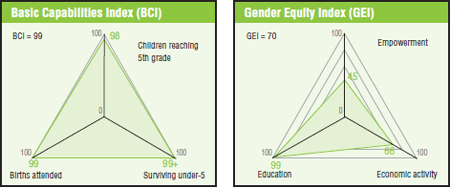Italy
Change of Direction Needed to Implement the 2030 Agenda
Due to the lasting impact of the international financial crisis and resulting increase in poverty and insecurity, and especially due to the Government’s extensive austerity policies, Italy faces challenges in many of the areas addressed by the 2030 Agenda for Sustainable Development goal. Moreover, the political context is critical, the result of three changes of Government without elections, in which the executive power has taken decisive initiatives for reform in many fields, including constitutional reforms, resulting in a progressive worsening of the gap between the political action of the "palace" and the daily exercise of citizen democratic participation.
Published on Thu, 2016-09-08 20:32
Due to the lasting impact of the international financial crisis and resulting increase in poverty and insecurity, and especially due to the Government’s extensive austerity policies, Italy faces challenges in many of the areas addressed by the 2030 Agenda for Sustainable Development goal. Even in the one area that has seen a positive trend in recent years, namely, the development of renewable energy, there has been a reversal of the virtuous cycle since 2015. In the absence of a national energy plan, government policies continue to encourage fossil fuels (despite popular opposition), and large infrastructural works with new rules to eliminate environmental controls (introduced through the Stability Law in 2016) and with an increase in soil depletion. |
Published on Thu, 2013-04-11 11:20
As a whirlpool, the crisis that has been lasting for the past 5 years has hit Italy hard in 2012. The deterioration of the living conditions of a large part of the Italian population concerned especially the "working poor": in Italy, there are three million, about 15% of the total employed. Eight million Italians live with less than one thousand euro per month. The crisis has seriously damaged the middle class. |
|
Published on Mon, 2012-03-19 08:51
In terms of gender equity Italy lags behind the European average, and also behind some of its neighbours. This is made apparent by the publication of the Gender Equity Index (GEI) 2012, published by Social Watch on the eve of Women’s International Day, March 8. |
Published on Tue, 2010-02-09 08:11
"Il Ruolo dell’Italia nella governance mondiale: tra delusioni e speranze della società civile” |
| Source: . Published on Thu, 2009-03-19 16:53 |
|
Published on Mon, 2007-09-03 13:49
Sbilanciamoci!, an Italian campaign working on issues related to the national budget, will held its annual forum in Venice. See the program. |
|
Published on Wed, 2007-05-23 09:41
Social Watch Italy organized several activities on occasion of the launching of the 2006 Report “Architettura Impossibile”. Areli Sandoval (Equipo Pueblo, SW Mexico), co-chair of the Coordinating Committee of Social Watch made a presentation on 2 May, at the Italian Parliament in Rome, with the presence of members of the European Parliament as well as Italian government representatives. On 3 May, a debate was organized at the Municipality of Florence, where the SW Report was launched with a strong message on the role of civil society in promoting social development and human rights. |





